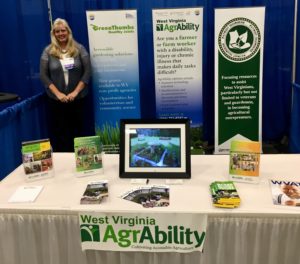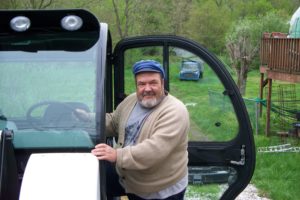By Matt Browning
According to the U.S. Department of Agriculture (USDA), more than 200,000 farmers, ranchers and agricultural workers acquire occupational injuries each year that limit their ability to perform essential work tasks.
The West Virginia AgrAbility program exists to assist these farmers and their family members with education and resources, ensuring our state’s farmers can maintain long and—literally—fruitful careers in the agriculture industry.

West Virginia AgrAbility Extension Agent Inetta Fluharty
“I have always believed that anyone, regardless of disability, could do whatever they wanted to do if given the right tools for the job,” says AgrAbility Extension Agent Inetta Fluharty.
Through education and assistance, AgrAbility helps minimize obstacles that block success in production agriculture or agriculture-related occupations. The program targets farmers and workers who are limited by a physical or cognitive disability, illness or injury that make it difficult to perform agricultural tasks.
The free program includes the following services:
- On-site assessments to identify barriers to completing tasks in the agricultural workplace and home
- Recommendations of appropriate assistive technologies, modified work practices and possible solutions to overcoming disability-related limitations
- Informational materials on a variety of topics related to disability and agriculture
- Education and training opportunities through workshops, conferences and seminars
- Referrals to service providers specific to clients’ needs
- Connection to peer support from others who successfully overcame barriers by finding effective accommodation solutions
Fluharty, who has served as program coordinator since 2001, is proud of the program’s achievements, as well as how it has enriched her own life.

Farmer receives Toolcat to assist in orchard.
“On a personal level, this program has allowed me to combine my passions for farming and working with people with disabilities,” says Fluharty, who operates a farm that has been in her family since the late 1700s.
These farmers need a whole array of assistive technology in order to succeed, much like a carpenter needs a wide array of tools to build a house, and AgrAbility is here to help make those necessary connections.
According to Fluharty, all of the farmers she has worked with over the years are still farming unless they have passed away. While AgrAbility has never directly provided funding or equipment, the program often works with state vocational rehabilitation agencies and other funding sources to help customers obtain the needed assistive technologies and modifications. While changes in funding sources have caused some limitations in the program in recent months, Fluharty is actively working with various agencies to seek additional funds.
West Virginia AgrAbility is a collaborative partnership between the extension services of West Virginia University and West Virginia State University, as well as the Arc of the Mid-Ohio Valley and the West Virginia Assistive Technology System.
 About the Author
About the Author
Matt Browning is the director of communications at West Virginia State University (WVSU) with an emphasis on research and public service and an online instructor with the West Virginia University (WVU) Reed College of Media. He received a master’s degree in integrated marketing communications from WVU and a bachelor’s degree in communications from WVSU. A Logan native, he currently resides in South Charleston and is an aspiring novelist.




1 Comment
Great article!!